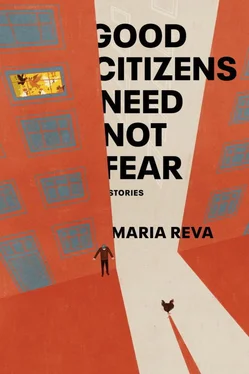Neighbors rarely visited each other, and if they did, it was to complain about a leak in the ceiling or to spy out who had better wallpaper and why. Smena tossed the pouch of cloves on the table, hoping the woman would take what she’d come for and leave.
“I’m Nika, from fifth,” the neighbor said. “Have a biscuit.” From her canvas sack she produced a small plastic bag, rolled down its rim, and Smena felt a pang of delight: inside were the same cheap biscuits Smena used to buy at the bazaar, the ones that had the shape and consistency of a fifty-kopek coin and had to be soaked in tea to save teeth from breaking. This gesture meant her guest wanted tea, which she, the host, should have offered long ago, upon greeting.
Nika craned her neck for a better view down the corridor. “Say, this a one-room or two-room?” Nika pronounced her words with a dawdling slur that was at odds with her quick movements. Smena wondered if the woman was recovering from a stroke.
“Two-room.”
“For one person?”
Smena tensed. Anything she said, already she could hear being repeated around the block. “My husband snored.” This was true: Smena had shared the sofa bed with her daughter, in the other room, until the girl had moved in with her fiancé’s family many towns away.
To occupy herself, Smena set the kettle on the stove. When she turned back to the woman, beside the biscuits lay a black plastic sheet. An X-ray scan. Smena recognized it instantly; she had a stack of them in the cupboard beside the refrigerator.
“I hear you make a nice ruble copying vinyl records onto X-rays,” said Nika.
Smena’s brows lifted in mock surprise. “Who told you that?”
“A friendly worm in the ground.”
“The friendly worm is mistaken.”
“I used to own a few bone albums myself, a long time ago,” Nika went on. “Only played them a couple times before they got worn through. Didn’t compare to vinyl, of course, but that’s how you got the real music.” By “real” she meant banned music. American rock ’n’ roll, decadent capitalist filth, the stuff with sex and narcotics. Smena’s specialty. She had begun copying bootlegged albums in the postwar years, when she and her husband were desperate for money and radiographic film was the cheapest, most readily accessible form of plastic. Now, with the national shortage of reel cassettes—the national shortage of everything—Smena was back in business.
“I hear your records are the best,” said Nika. “Can play for days.”
Smena hunched her shoulders in an attempt to make her broad frame appear small, innocuous. “I don’t know what you’re talking about. I’m a simple pensioner, just like you.”
“A simple pensioner like me doesn’t have a two-room all to herself.”
Smena detected judgment in Nika’s voice—it was uncouth for a woman, especially one far along in her years, to take up so much space—but also envy.
When the kettle whistle blew, Smena was wary of turning her back to the woman again; she imagined discovering a pile of X-rays, or the woman’s entire family, in the kitchen. She reached a hand behind her hips to turn off the gas, fumbled with the cutlery drawer for a spoon—then stopped. This was the same drawer that contained the lathe for engraving X-rays. Smena used her fingers to pinch tea leaves into cups, and stirred the tea by whirling each cup in a circle.
“I hope you can help me,” said Nika.
“Sugar in your tea?”
“Please. Say, ever got an X-ray done yourself?”
“Everyone has.”
“The radiation alone is enough to kill you, just slower than whatever it is they’re checking for.” Nika paused, as though waiting for Smena to say something. “What were they checking for?”
“A bout of pneumonia, a couple years ago,” said Smena, distracted. She’d remembered the sugar jar lived in the same cupboard as the record player—which was a perfectly mundane object in itself, but not if seen in conjunction with the lathe. “I forgot, I’m out of sugar.”
The two women drank their tea bitter. Smena observed that once, when Nika made to dip her biscuit, she missed the cup, tapped the table instead, noticed the error, and dipped the biscuit into her cup with vigor. Before her guest left, Smena tried to push the X-ray back into her hands, but Nika refused. “I’ll be back with your cloves,” she said from the doorway.
“Keep them.”
“You can reuse them up to three times. I read about it.”
“Keep reusing them, then.”
“Oh, I couldn’t.”
Smena forced a smile. “It’s a gift.”
“I’m the one who should be gifting you gifts, for helping me.”
“I haven’t done anything to help you.”
“But you will,” said Nika. “I can always pick out the good people. Like good watermelons.” She was about to head off at last, then paused and turned to face Smena again. “You said your husband snored. What fixed it?”
“He died.”
Nika winked. “I’m divorced, too. They say our building is cursed.”
Smena closed the door on the woman, to hide her own blush. She shoved the X-ray in the garbage bin under the sink. Her underground business made Smena vulnerable to extortion. If Nika visited again, she might ask for more than cloves.
But the X-ray did not stay in the bin long.
Smena’s worst traits, her mother had once informed her, were her height and her curiosity.
It was the golden hour, the best time of day to inspect new X-rays, when sunbeams shot directly through Smena’s kitchen window, illuminating each feathery detail of the bones. Smena lived on the tenth floor, and the neighboring building was far enough from hers for the X-ray viewings to be conducted in privacy. She secured Nika’s scan onto her window with suction cups.
The profile of a skull shone at her. The architecture of a human head never failed to shock Smena, or make her wonder how such a large bulbous weight balanced on the thin stack of vertebrae.
Smena couldn’t help but feel excitement: a head X-ray did not come her way as often as those of other body parts. And heads were the most popular with the buyers, fetched the most money. A shame she couldn’t use this one. She would not be lured into Nika’s trap.
The small white letters on the bottom right-hand corner of the film, easily overlooked by the untrained eye, read VERONIKA L. GUPKA, TUMOR. Smena noticed a thinning at the base of the skull, a shadow overtaking it from inside. The thing looked contagious, like a curse. She didn’t like the tumor hanging on her window, projecting its tendrils onto her kitchen wall.
She understood then: the woman was dying. Whatever she wanted from Smena stemmed from this fact.
Smena hid the scan, but this time, despite herself, she did not try to dispose of it.
—
Megadeth’s growls and screams, banned in all fifteen Soviet republics, came from Smena’s cupboard record player—at minimal volume, of course.
“I’m with the Kremlin on this one,” said Milena, Smena’s dealer. “If these are the latest tunes from the West, maybe the place really is rotting.” As usual, Milena stood leaning against the windowsill, ignoring the vacant stool in front of her. She seemed to prefer heights, like a cat, Smena had noticed.
This was their biweekly meeting. Milena brought wads of cash from selling bone albums at subway stations, public squares, and parks, and Smena counted the profit, taking the largest cut for herself. Next, Milena presented her with an array of X-ray scans procured through her job as a polyclinic custodian, and Smena picked out the most desirable designs. Today’s winning selection included a foot that had been subjected to an asphalt roller; a handsome pelvic girdle; a torso with what looked like a prominent colon but was really the spine of a fetus; a child’s hand curled into an obscene gesture.
Читать дальше












